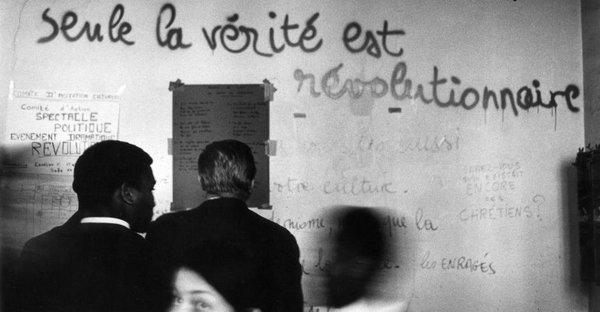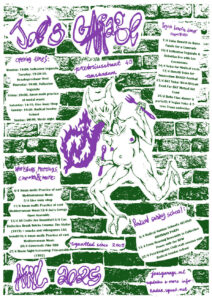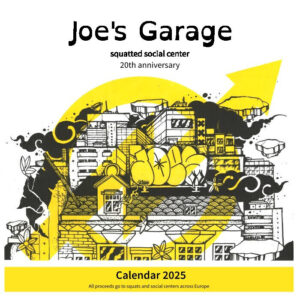 Sunday 20 May 2018, Can Dialectics Break Bricks Cinema.
Sunday 20 May 2018, Can Dialectics Break Bricks Cinema.
L’AN 01 1969 MAY 68 Directed by Jacques Doillon, Gébé, Alain Resnais and Jean Rouch. 90 minutes. In French with English subtitles.
Doors open at 20:00. Intro starts at 20:30
This is a collective film, where each of the filmmakers worked separately, but all of them were influenced by a single source—a utopian comic strip devised by the legendary cartoonist Gébé. It’s a farce with a free-wheeling avant-garde approach to cinema, embracing a ludic spirit of subversion. Although this satire is loaded with humour, it is also very ‘engaged’ and can be compared to the experimental ciné-tract short movies that were shot on the barricades. It is unstructured in its form, and changes style as it drifts along, touching on issues connected to ’68—the ecology, rejection of authority, challenges to growth and productivity, anti-war, free love, pollution, communal living, rejection of private property and demolishing the idea of forced labor.
This flick is a fable, and one that proposes with gleeful abandonment the following utopian scenario: all of a sudden, all the ordinary people throughout the world stopped working and money becomes worthless. Once everything has come to a grinding halt, we could bring back—reluctantly—only the services and products we really need. What follows is a wide-ranging series of whimsical sketches, a bit like a Monty Python narrative, of how different people react to such a situation. For example, the contribution of anthropologist Jean Rouch is documentary-like and harpoons the domination of northern countries over the south, and the so-called first world over the third world—something that is still alive and kicking today.
The tone is festive and all of the passages are marked with the cutting-edged humour of Gébé. Among the cast of actors are illustrators Georges Wolinski and Jean Cabut, who were both were killed in the January 7th, 2015 terrorist attack on the office of the satirical magazine Charlie Hebdo. Also on hand are several actors that would only later become well-known… Gérard Depardieu, Patrick Dewaere and Miou-Miou.
Film night at Joe’s Garage, cozy cinema! Free entrance. You want to play a movie, let us know: joe [at] squat [dot] net




